The drone test stand market is likely to grow from USD 1,665.4 million in 2025 to USD 5,856.7 million by 2035, representing substantial growth, demonstrating the accelerating adoption of advanced testing equipment formulations and premium validation technology across military defense operations, aerospace manufacturing, and commercial drone sectors.
The first half of the decade (2025-2030) will witness the drone test stand market climbing from USD 1,665.4 million to approximately USD 3,123.1 million, adding USD 1,457.7 million in value, which constitutes 47% of the total forecast growth period. This phase will be characterized by the rapid adoption of power system test stand configurations, driven by increasing drone production volumes and the growing need for comprehensive performance validation requirements worldwide. Advanced testing capabilities and flexible measurement systems will become standard expectations rather than premium options.
The latter half (2030-2035) will witness sustained growth from USD 3,123.1 million to USD 5,856.7 million, representing an addition of USD 2,733.6 million or 53% of the decade's expansion. This period will be defined by mass market penetration of specialized test stand designs, integration with comprehensive automated testing platforms, and seamless compatibility with existing quality control infrastructure. The drone test stand market trajectory signals fundamental shifts in how manufacturers approach drone certification and reliability management, with participants positioned to benefit from sustained demand across multiple test stand types and application segments.
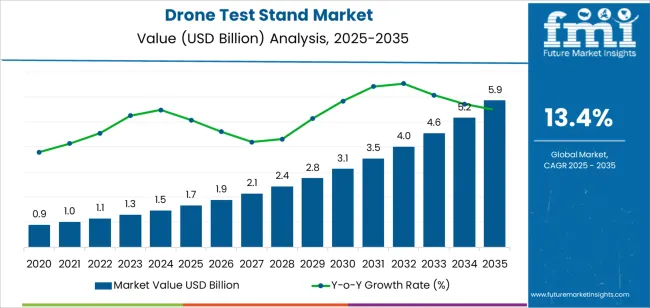
The Drone Test Stand market demonstrates distinct growth phases with varying market characteristics and competitive dynamics. Between 2025 and 2030, the drone test stand market progresses through its validation technology adoption phase, expanding from USD 1,665.4 million to USD 3,123.1 million with steady annual increments averaging 13.4% growth. This period showcases the transition from basic testing equipment to advanced power system test stand designs with enhanced measurement capabilities and integrated data acquisition systems becoming mainstream features.
The 2025-2030 phase adds USD 1,457.7 million to market value, representing 47% of total decade expansion. Market maturation factors include standardization of drone testing and UAV certification protocols, declining component costs for specialized test equipment, and increasing industry awareness of quality assurance benefits reaching optimal validation effectiveness in military and aerospace applications. Competitive landscape evolution during this period features established test equipment manufacturers like Eureka Dynamics and Tyto Robotics expanding their drone test stand portfolios while specialty manufacturers focus on advanced measurement development and enhanced automation capabilities.
From 2030 to 2035, market dynamics shift toward advanced testing integration and global drone manufacturing expansion, with growth continuing from USD 3,123.1 million to USD 5,856.7 million, adding USD 2,733.6 million or 53% of total expansion. This phase transition centers on specialized test stand systems, integration with artificial intelligence validation networks, and deployment across diverse commercial and defense drone scenarios, becoming standard rather than specialized applications. The competitive environment matures with focus shifting from basic testing capability to comprehensive quality assurance systems and integration with manufacturing execution monitoring platforms.
| Metric | Value |
|---|---|
| Market Value (2025) | USD 1,665.4 million |
| Market Forecast (2035) | USD 5,856.7 million |
| Growth Rate | 13.4% CAGR |
| Leading Technology | Power System Test Stand Type |
| Primary Application | Military Defense Segment |
The drone test stand market demonstrates strong fundamentals with power system test stand configurations capturing a dominant share through advanced propulsion testing and performance measurement optimization capabilities. Military defense applications drive primary demand, supported by increasing unmanned system deployment and drone certification technology requirements. Geographic expansion remains concentrated in developed markets with established aerospace infrastructure, while emerging economies show accelerating adoption rates driven by defense modernization expansion and rising quality standards.
Market expansion rests on three fundamental shifts driving adoption across the military defense, aerospace, and commercial drone sectors. First, quality assurance demand creates compelling operational advantages through drone test stands that provide immediate performance validation and reliability verification without compromising certification goals, enabling manufacturers to meet stringent safety standards while maintaining production productivity and reducing development costs. Second, drone manufacturing modernization accelerates as producers worldwide seek advanced testing systems that complement production processes, enabling precise performance characterization and quality control that align with industry standards and regulatory requirements.
Third, certification compliance enhancement drives adoption from military contractors and commercial drone manufacturers requiring effective testing solutions that maximize product reliability while maintaining operational efficiency during development and production operations. However, growth faces headwinds from capital investment challenges that vary across drone manufacturers regarding the acquisition of specialized test equipment and laboratory infrastructure costs, which may limit adoption in cost-sensitive operations. Technical limitations also persist regarding test accuracy and environmental simulation concerns that may reduce effectiveness in extreme condition validation and real-world scenario replication, which affect certification completeness and operational requirements.
The drone test stand market represents a critical yet specialized testing equipment opportunity driven by expanding global drone production, military modernization programs, and the need for superior validation performance in diverse UAV applications. As manufacturers worldwide seek to achieve optimal performance verification, ensure regulatory compliance, and integrate advanced testing systems with automated platforms, drone test stands are evolving from basic benchtop equipment to sophisticated validation solutions ensuring quality excellence and certification leadership.
The drone test stand market's growth trajectory from USD 1,665.4 million in 2025 to USD 5,856.7 million by 2035 at a 13.4% CAGR reflects fundamental shifts in drone industry quality requirements and testing optimization. Geographic expansion opportunities are particularly pronounced in Asia Pacific markets, while the dominance of power system test stands and military defense applications provides clear strategic focus areas.
Strengthening the dominant power system test stand segment (42.0% market share) through enhanced sensor capabilities, superior data acquisition performance, and integrated analysis systems. This pathway focuses on optimizing measurement accuracy, improving testing throughput, extending operational effectiveness to comprehensive validation rates, and developing specialized configurations for diverse applications. Market leadership consolidation through advanced measurement engineering and automation integration enables premium positioning while defending competitive advantages against manual testing alternatives. Expected revenue pool: USD 380-535 million
Rapid drone manufacturing and military modernization growth across Asia Pacific creates substantial expansion opportunities through local test equipment production capabilities and technology transfer partnerships. Growing defense drone programs and commercial UAV initiatives drive sustained demand for advanced test stand systems. Localization strategies reduce import costs, enable faster technical support, and position companies advantageously for procurement programs while accessing growing domestic markets. Expected revenue pool: USD 305-435 million
Expansion within the dominant military defense segment (48.0% market share) through specialized test stand designs addressing military certification standards and high-reliability requirements. This pathway encompasses tactical drone testing systems, endurance validation integration, and compatibility with diverse defense procurement operations. Premium positioning reflects superior testing rigor and comprehensive qualification documentation supporting modern military programs. Expected revenue pool: USD 260-375 million
Strategic expansion into aerospace applications (32.0% market share) requires enhanced certification compatibility and specialized test systems addressing aviation authority operational requirements. This pathway addresses civil aviation standards integration, beyond visual line of sight validation, and passenger-carrying drone systems with advanced safety engineering for demanding aerospace standards. Premium pricing reflects specialized certification requirements and aviation compliance standards. Expected revenue pool: USD 215-315 million
Development of specialized structural test stand formulations (28.0% share) and flight control system test stands (30.0%), addressing specific load testing requirements and avionics validation demands. This pathway encompasses fatigue testing designs, controller validation optimization, and versatile alternatives for diverse development segments. Technology differentiation through modular architectures enables diversified revenue streams while reducing dependency on single test equipment platforms. Expected revenue pool: USD 180-265 million
Expansion of business application segment (20.0% market share) through enhanced commercial certification support, superior cost-effectiveness properties, and specialized delivery drone requirements. This pathway encompasses package delivery testing, agricultural drone validation, and specialty commercial applications requiring reliable test capabilities. Market development through commercial sector partnerships enables differentiated positioning while accessing high-volume commercial markets requiring cost-effective testing solutions. Expected revenue pool: USD 145-215 million
Development of automated testing capabilities and AI-powered analysis systems addressing efficiency requirements and data processing demands across defense and commercial scenarios. This pathway encompasses autonomous test execution, machine learning validation, and comprehensive performance analytics. Market positioning reflects technological leadership and efficiency benefits while enabling access to high-throughput manufacturing programs and rapid development partnerships. Expected revenue pool: USD 110-170 million
Primary Classification: The market segments by test stand type into Power System Test Stand, Structural Test Stand, Flight Control System Test Stand, and Others categories, representing the evolution from basic propulsion testing to comprehensive validation solutions for full drone system optimization.
Secondary Classification: Application segmentation divides the market into Military Defense, Aerospace, and Business Applications sectors, reflecting distinct requirements for certification standards, testing rigor, and operational validation.
Regional Classification: Geographic distribution covers Asia Pacific, Europe, North America, and other regions, with developed markets leading adoption while emerging economies show accelerating growth patterns driven by defense modernization expansion programs.
The segmentation structure reveals technology progression from single-purpose test equipment toward integrated multi-parameter test stands with enhanced automation and data analysis capabilities, while application diversity spans from military drone validation to specialized commercial and aerospace applications requiring comprehensive testing solutions.
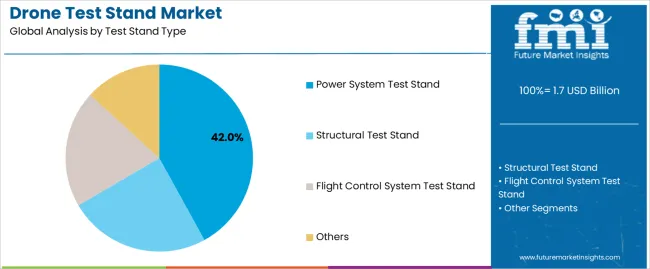
Market Position: Power system test stand configurations command the leading position in the Drone Test Stand market with approximately 42% market share through critical testing properties, including thrust measurement capability, motor efficiency characterization, and propulsion validation that enable manufacturers to achieve optimal performance verification across diverse military and commercial drone environments.
Value Drivers: The segment benefits from manufacturer preference for comprehensive propulsion testing that provides consistent performance data, reliable validation results, and design optimization without requiring multiple testing setups. Advanced measurement features enable real-time data acquisition, torque curve analysis, and integration with existing development workflows, where thrust accuracy and efficiency characterization represent critical validation requirements.
Competitive Advantages: Power system test stand configurations differentiate through proven measurement reliability, comprehensive parameter capture characteristics, and integration with automated testing protocols that enhance development efficiency while maintaining optimal validation accuracy suitable for diverse quadcopter, fixed-wing, and hybrid drone applications. The segment's dominance is reinforced by comprehensive industry validation across major drone manufacturers and defense contractors, established calibration standards supporting certification requirements, and continuous innovation in sensor technology that addresses evolving propulsion system requirements and performance optimization needs.
Key market characteristics:
Flight control system test stand configurations maintain significant market positioning in the Drone Test Stand market with approximately 30.0% market share due to their avionics validation properties and autopilot testing advantages. These systems appeal to manufacturers requiring comprehensive flight controller verification with adequate performance for software-in-the-loop applications. Market adoption is driven by autonomous drone expansion, highlighting reliable avionics validation solutions and operational safety through optimized hardware-in-the-loop testing while maintaining competitive development costs.
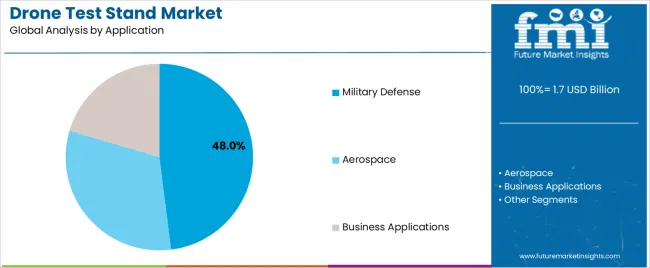
Market Context: Military defense applications dominate the Drone Test Stand market with approximately 48% market share due to widespread adoption of unmanned systems and increasing focus on mission reliability, combat readiness validation, and tactical performance applications that minimize field failures while maintaining defense industry standards.
Appeal Factors: Defense contractors prioritize testing rigor, certification compliance, and integration with existing military qualification infrastructure that enables coordinated validation operations across multiple drone development programs. The segment benefits from substantial defense investment and modernization programs that emphasize the acquisition of test stands for reliability verification and performance optimization applications.
Growth Drivers: Military drone procurement programs incorporate advanced test stands as standard validation equipment for modern UAV development operations, while autonomous warfare system growth increases demand for comprehensive testing capabilities that comply with military standards and optimize combat readiness. The growing emphasis on swarm drone technology is driving demand for high-throughput test stand systems that validate multiple units simultaneously across diverse mission profiles, while increasing counter-drone system development requires manufacturers to implement specialized test equipment to support electronic warfare capability verification and operational effectiveness maintenance throughout threat environment scenarios.
Market Challenges: Varying military specifications and classified testing requirements may limit test equipment standardization across different defense programs or national requirements.
Application dynamics include:
Aerospace applications capture approximately 32.0% market share through civil aviation certification requirements in passenger drone operations, urban air mobility development, and commercial aviation scenarios demanding ultra-reliable test stand systems capable of validating airworthiness under regulatory conditions while providing exceptional documentation and traceability capabilities to support aviation authority approval processes.
Business applications account for approximately 20.0% market share through commercial delivery drone testing, agricultural UAV validation, and inspection drone requirements, while other segments represent specialized applications including research institutions, educational programs, and hobbyist development requiring test stand capabilities for diverse performance verification and quality compliance.
Growth Accelerators: Military modernization drives primary adoption as drone test stands provide comprehensive validation capabilities that enable defense contractors to meet qualification standards without excessive development iterations, supporting program success and mission readiness that require optimal performance verification applications. Commercial drone expansion demand accelerates market expansion as manufacturers seek effective testing systems that optimize product reliability while maintaining development effectiveness during certification and production scenarios. Aerospace industry investment increases worldwide, creating sustained demand for advanced test stand systems that complement modern UAV development and provide competitive advantages in safety-critical markets.
Growth Inhibitors: Capital investment challenges vary across drone manufacturers regarding the acquisition of specialized test equipment and laboratory facility costs, which may limit operational flexibility and market penetration in regions with constrained budgets or startup operations. Technical performance limitations persist regarding environmental simulation capabilities and dynamic testing complexity that may reduce effectiveness in extreme condition validation, real-world scenario replication, or multi-system integration testing conditions, affecting certification completeness and validation requirements. Market fragmentation across multiple drone types and testing standards creates equipment compatibility concerns between different test stand suppliers and existing development infrastructure.
Market Evolution Patterns: Adoption accelerates in military and aerospace sectors where certification rigor justifies test equipment investment costs, with geographic concentration in developed markets transitioning toward rapid adoption in emerging economies driven by defense modernization and commercial drone expansion. Technology development focuses on enhanced automation capabilities, improved artificial intelligence integration, and compatibility with digital twin validation that optimize testing efficiency and data quality. The drone test stand market could face disruption if virtual testing technologies or computational fluid dynamics significantly reduce the need for physical test stands, though hardware validation's combination of real-world verification, certification acceptance, and empirical data reliability continues to make it essential in drone development and qualification processes.
The Drone Test Stand market demonstrates varied regional dynamics with Growth Leaders including China (18.1% CAGR) and India (16.8% CAGR) driving expansion through military drone capacity additions and commercial UAV programs. Steady Performers encompass Germany (15.4% CAGR), Brazil (14.1% CAGR), and United States (12.7% CAGR), benefiting from established defense industries and advanced aerospace technology adoption. Mature Markets feature United Kingdom (11.4% CAGR) and Japan (10.1% CAGR), where specialized defense applications and premium testing integration support consistent growth patterns.
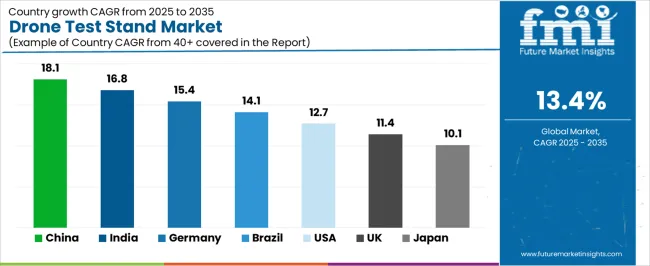
| Country | CAGR (2025-2035) |
|---|---|
| China | 18.1% |
| India | 16.8% |
| Germany | 15.4% |
| Brazil | 14.1% |
| United States | 12.7% |
| United Kingdom | 11.4% |
| Japan | 10.1% |
Regional synthesis reveals Asia Pacific markets leading adoption through drone manufacturing expansion and defense modernization infrastructure development, while European countries maintain strong expansion supported by advanced aerospace regulations and urban air mobility requirements. North American markets show robust growth driven by military drone applications and commercial delivery system integration trends.
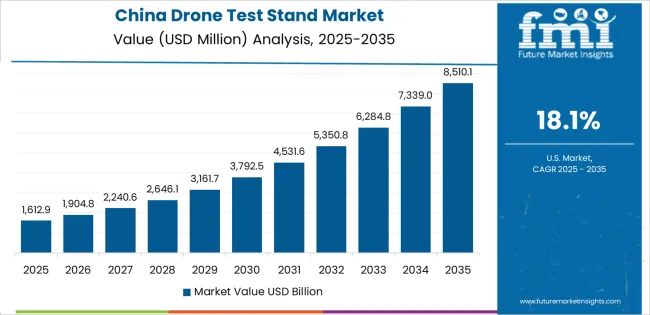
The Chinese market emphasizes advanced testing infrastructure features, including high-precision measurement systems and integration with comprehensive drone development platforms that manage performance validation, quality control, and certification applications through unified engineering systems. The country demonstrates strong growth at 18.1% CAGR, driven by massive drone production expansion, military modernization initiatives, and emerging commercial UAV development that support test stand integration. Chinese manufacturers prioritize operational effectiveness with drone test stands delivering consistent validation through advanced sensor capabilities and automated testing features.
Technology deployment channels include major drone manufacturers, military research institutes, and aerospace development centers that support professional applications for complex propulsion testing and flight controller validation operations. Development platform integration capabilities with established CAD/CAE systems expand market appeal across diverse operational requirements seeking accuracy and efficiency benefits. The expanding drone export market and accelerating autonomous system development create sustained demand, while innovative applications in swarm testing and AI validation open new growth avenues.
Performance Metrics:
Germany's advanced aerospace market demonstrates sophisticated drone test stand deployment with documented operational effectiveness in aviation certification applications and defense development through integration with existing engineering systems and testing infrastructure. The country leverages engineering expertise in measurement technology and aerospace systems integration to maintain strong growth at 15.4% CAGR. Industrial centers, including Munich, Hamburg, and Stuttgart, showcase premium installations where test stand systems integrate with comprehensive development platforms and quality management systems to optimize validation performance and certification effectiveness.
German manufacturers prioritize system precision and EU aviation compliance in equipment selection, creating demand for premium test stand systems with superior features, including automated data analysis and comprehensive documentation capabilities. The drone test stand market benefits from established aerospace infrastructure and a willingness to invest in validation technologies that provide long-term certification benefits and compliance with international aviation and defense standards.
Market Intelligence Brief:
The USA drone test stand market demonstrates sophisticated deployment across military and commercial applications with documented effectiveness in tactical drone programs and urban air mobility development through integration with comprehensive validation systems and certification infrastructure. The country leverages advanced aerospace capabilities in testing innovation and measurement optimization technologies to maintain robust growth at 12.7% CAGR. Defense centers, including California, Texas, and Virginia, showcase extensive installations where test stand systems integrate with comprehensive military platforms and FAA certification networks to optimize validation efficiency and compliance effectiveness.
American contractors prioritize testing versatility and data quality in equipment selection, creating demand for innovative test stand systems with advanced features, including multi-parameter measurement and comprehensive simulation integration. The drone test stand market benefits from established defense infrastructure and willingness to invest in validation technologies that provide long-term program success and compliance with military qualification and FAA certification standards.
Market Intelligence Brief:
The UK drone test stand market demonstrates advanced validation deployment with documented operational effectiveness in military applications and aerospace development through integration with existing defense compliance systems and certification infrastructure. The country leverages regulatory expertise in aviation testing and defense systems integration to maintain steady growth at 11.4% CAGR. Defense centers, including Farnborough, Bristol, and Cambridge, showcase installations where test stand systems integrate with comprehensive military platforms and CAA certification systems to optimize qualification and validation effectiveness.
British contractors prioritize system compliance and certification documentation in equipment selection, creating demand for certified test stand systems with advanced features, including traceability capabilities and comprehensive validation protocols. The drone test stand market benefits from established defense infrastructure and commitment to invest in validation technologies that provide long-term program success and compliance with UK and EU aviation and military standards. Military drone applications, urban air mobility systems, and defense research programs drive diversified demand across multiple sectors.
Strategic Market Indicators:
India's drone test stand market demonstrates rapid expansion deployment with documented operational effectiveness in defense applications and commercial UAV development through integration with emerging aerospace systems and manufacturing infrastructure. The country leverages growing defense capabilities in drone technology and testing systems integration to achieve high growth at 16.8% CAGR. Defense centers, including Bangalore, Hyderabad, and Pune, showcase expanding installations where test stand systems integrate with comprehensive military platforms and commercial development networks to optimize market penetration and validation effectiveness.
Indian manufacturers prioritize cost-effectiveness and operational reliability in equipment selection, creating demand for scalable test stand systems with competitive features, including proven measurement accuracy and local support capabilities. The drone test stand market benefits from expanding defense drone infrastructure and willingness to invest in validation technology that provides certification benefits and compliance with emerging aviation standards.
Market Intelligence Brief:
Brazil's drone test stand market demonstrates growth deployment with documented operational effectiveness in agricultural drone applications and defense programs through integration with established aerospace systems and development infrastructure. The country leverages agricultural technology capabilities in commercial UAV development and military modernization to achieve growth at 14.1% CAGR. Technology centers, including São Paulo, Rio de Janeiro, and Brasília, showcase installations where test stand systems integrate with agricultural research platforms and defense development operations to optimize validation and operational effectiveness.
Brazilian manufacturers prioritize operational reliability and application-specific testing in equipment selection, creating demand for versatile test stand systems with proven performance and agricultural application support. The drone test stand market benefits from established agricultural drone sector and growing defense modernization that provides sustained demand for UAV testing technology.
Market Intelligence Brief:
Japan's drone test stand market demonstrates precision deployment with documented operational effectiveness in defense applications and commercial development through integration with advanced engineering systems and quality control infrastructure. The country leverages engineering excellence in precision measurement technology and aerospace systems integration to maintain steady growth at 10.1% CAGR. Technology centers, including Tokyo, Nagoya, and Osaka, showcase premium installations where test stand systems integrate with comprehensive quality platforms and validation monitoring systems to optimize engineering excellence and testing effectiveness.
Japanese manufacturers prioritize system precision and measurement reliability in equipment selection, creating demand for premium test stand systems with advanced features, including micro-precision sensors and comprehensive data validation. The drone test stand market benefits from established aerospace infrastructure and commitment to invest in highest-quality testing equipment that provides superior validation accuracy and compliance with stringent Japanese defense and aviation standards.
Strategic Market Indicators:
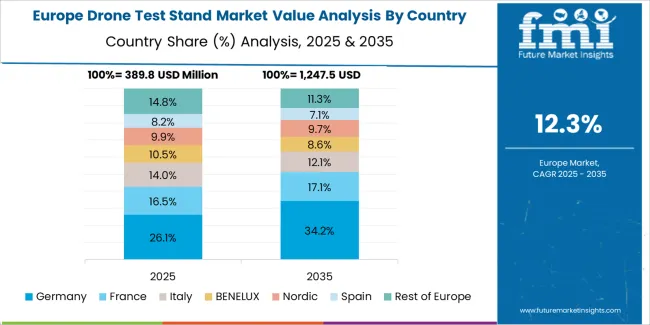
The Drone Test Stand market in Europe is projected to grow substantially over the forecast period, with Germany expected to maintain its leadership position with a significant market share supported by its advanced aerospace infrastructure and major UAV development centers in Munich and Hamburg. France follows with strong market presence, driven by comprehensive military drone programs and urban air mobility initiatives. The United Kingdom holds substantial market share through specialized defense UAV activities, aerospace certification applications, and research institution operations.
Italy commands notable market presence through strong defense modernization and commercial drone projects. Spain accounts for growing market share aided by agricultural drone development and commercial UAV adoption. Sweden maintains steady share driven by specialty defense applications and autonomous system demand. The Rest of Europe region is anticipated to show steady adoption, reflecting consistent growth in Nordic countries, UAV development expansion in Central European markets, and testing infrastructure upgrades across Eastern European defense facilities.
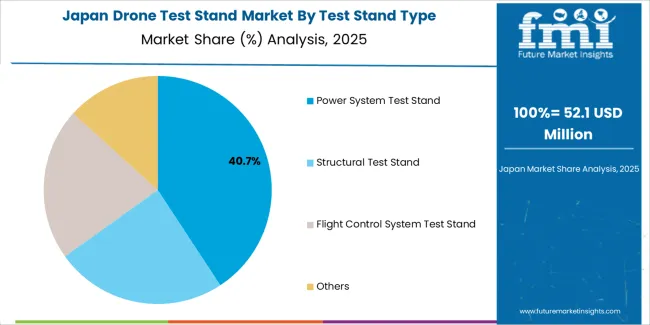
In Japan, the Drone Test Stand market prioritizes power system test stand configurations, which capture the dominant share of defense and commercial installations due to their advanced features, including precision thrust measurement optimization and seamless integration with existing drone development infrastructure. Japanese manufacturers emphasize accuracy, reliability, and long-term measurement excellence, creating demand for power system test stand systems that provide consistent propulsion validation capabilities and superior data quality performance based on engineering requirements and certification standards. Flight control system test stands maintain secondary positions primarily in avionics development applications and autopilot validation installations where comprehensive software verification meets operational requirements without compromising development efficiency.
Market Characteristics:
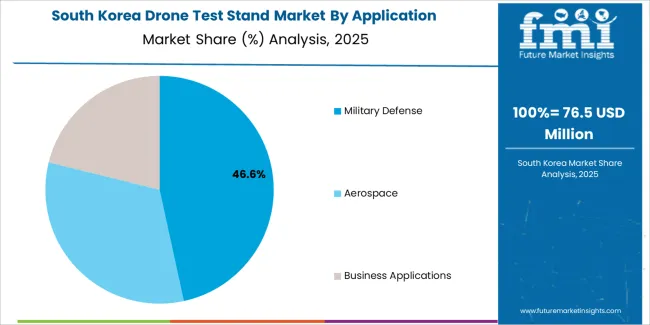
In South Korea, the drone test stand market structure favors specialized test equipment manufacturers, including Eureka Dynamics, Tyto Robotics, and Wing Flying Technologies, which maintain positions through comprehensive product portfolios and established defense industry networks supporting both military UAV and commercial drone installations. These providers offer integrated solutions combining advanced test stand systems with professional calibration services and ongoing technical support that appeal to Korean manufacturers seeking reliable validation technology. Local equipment distributors and engineering firms capture market share by providing localized support capabilities and competitive pricing for standard test stand installations, while domestic aerospace companies focus on specialized applications and cost-effective solutions tailored to Korean drone market characteristics.
Channel Insights:
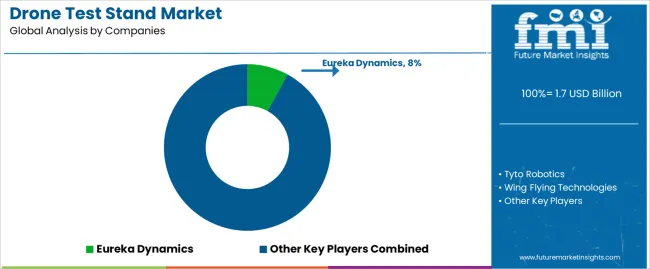
The Drone Test Stand market operates with moderate fragmentation, featuring approximately 20-30 meaningful participants, where leading companies control roughly 35-40% of the global market share through specialized drone testing expertise and comprehensive equipment portfolios. Competition emphasizes measurement accuracy, automation capabilities, and technical support strength rather than price-based rivalry. Leading companies maintain market presence through specialized test stand product lines and global drone development industry integration.
Market Leaders encompass Eureka Dynamics, Tyto Robotics, and Wing Flying Technologies, which maintain competitive advantages through extensive drone testing expertise, specialized measurement technologies, and comprehensive validation integration capabilities that create customer loyalty and support premium pricing. These companies leverage years of UAV testing experience and ongoing innovation investments to develop advanced test stand systems with accuracy optimization and automation features. Technology Innovators include Tianjin Hongyu Xiangsheng Intelligent Technology Development and Dynotis, which compete through specialized testing technology focus and innovative data acquisition capabilities that appeal to drone manufacturers seeking advanced validation solutions and development efficiency.
These companies differentiate through rapid customization development cycles and specialized application focus. Regional Specialists feature test equipment manufacturers focusing on specific geographic markets and specialized applications, including military-grade systems and integrated development solutions. Market dynamics favor participants that combine proven measurement accuracy with advanced automation capabilities, including comprehensive software integration support and automatic data analysis optimization features. Competitive pressure intensifies as traditional aerospace test equipment suppliers expand into drone applications, while drone technology companies develop in-house testing capabilities challenging established players through vertical integration strategies targeting defense and commercial segments.
The competitive environment is further shaped by strategic partnerships and technology collaborations among test equipment manufacturers seeking to capture emerging autonomous drone trends and urban air mobility certification requirements, alongside increasing investment in artificial intelligence analytics systems and digital twin integration to address validation efficiency demands and development acceleration needs from modern drone manufacturers seeking reliable and comprehensive test stand solutions throughout product development lifecycles and certification processes while maintaining optimal testing accuracy and data quality characteristics essential for regulatory approval and market success in increasingly competitive UAV industry landscapes.
| Item | Value |
|---|---|
| Quantitative Units | USD 1,665.4 million |
| Test Stand Type | Power System Test Stand, Structural Test Stand, Flight Control System Test Stand, Others |
| Application | Military Defense, Aerospace, Business Applications |
| Regions Covered | Asia Pacific, Europe, North America, Latin America, Middle East & Africa |
| Countries Covered | China, India, Germany, Brazil, United States, United Kingdom, Japan, and 20+ additional countries |
| Key Companies Profiled | Eureka Dynamics, Tyto Robotics, Wing Flying Technologies, Tianjin Hongyu Xiangsheng Intelligent Technology Development, Dynotis, AAMS, JMRRC, Oscar Liang, Aeroer Technology, Test Industry, FlyMod |
| Additional Attributes | Dollar sales by test stand type and application categories, regional adoption trends across Asia Pacific, Europe, and North America, competitive landscape with test equipment manufacturers and UAV development suppliers, manufacturer preferences for measurement accuracy and automation capabilities, integration with drone development platforms and quality management systems, innovations in propulsion testing technology and validation excellence, and development of automated solutions with enhanced data acquisition performance and certification optimization capabilities. |
The global drone test stand market is estimated to be valued at USD 1.7 billion in 2025.
The market size for the drone test stand market is projected to reach USD 5.9 billion by 2035.
The drone test stand market is expected to grow at a 13.4% CAGR between 2025 and 2035.
The key product types in drone test stand market are power system test stand, structural test stand, flight control system test stand and others.
In terms of application, military defense segment to command 48.0% share in the drone test stand market in 2025.






Full Research Suite comprises of:
Market outlook & trends analysis
Interviews & case studies
Strategic recommendations
Vendor profiles & capabilities analysis
5-year forecasts
8 regions and 60+ country-level data splits
Market segment data splits
12 months of continuous data updates
DELIVERED AS:
PDF EXCEL ONLINE
Drone Simulator Market Size and Share Forecast Outlook 2025 to 2035
Drones For Emergency Responders Market Size and Share Forecast Outlook 2025 to 2035
Drone Inspection and Monitoring Market Size and Share Forecast Outlook 2025 to 2035
Drone Cybersecurity Market Size and Share Forecast Outlook 2025 to 2035
Drone Logistics & Transportation Market Size and Share Forecast Outlook 2025 to 2035
Drone Warfare Market Size and Share Forecast Outlook 2025 to 2035
Drone Analytics Market Size and Share Forecast Outlook 2025 to 2035
Drone Battery Market Size and Share Forecast Outlook 2025 to 2035
Drone Delivery Service Market Analysis by Delivery Distance, Propeller Type, End User, and Region, and Forecast from 2025 to 2035
Drone Sensor Market - UAV Advancements & Forecast 2025 to 2035
Drone Motor Market Growth - Trends & Forecast 2025 to 2035
Toy Drones Market Size and Share Forecast Outlook 2025 to 2035
Anti-Drone Technology Market
LiDAR Drone Market Size and Share Forecast Outlook 2025 to 2035
Counter Drone System Market Size and Share Forecast Outlook 2025 to 2035
Medical Drones Market Report – Growth & Forecast 2025-2035
Tethered Drone Market Size and Share Forecast Outlook 2025 to 2035
Consumer Drones Market
Fumigation Drone Market Size and Share Forecast Outlook 2025 to 2035
Inspection Drone in Oil and Gas Market Size and Share Forecast Outlook 2025 to 2035

Thank you!
You will receive an email from our Business Development Manager. Please be sure to check your SPAM/JUNK folder too.
Chat With
MaRIA